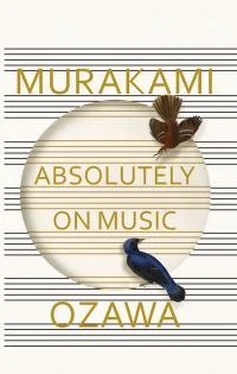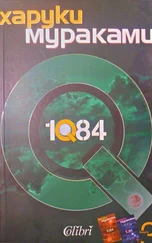MURAKAMI: You left Japan back in the days when there were still travel restrictions. You were going to get out no matter what, money or no money.
OZAWA: Yes, it’s true, and I was pretty reckless about it. There used to be these Symphony of the Air programs made up of members of the old NBC Symphony Orchestra after it disbanded. When I heard them, I knew there was no point in staying in Japan. I had to get out, period. And that’s what I did.
MURAKAMI: So now you’ve come full circle and you find yourself with a strong desire to come back to Japan and educate young musicians.
OZAWA: Yes, but that desire didn’t take shape until much later.
MURAKAMI: And now that you’re back and guiding young musicians in your own special way, you’re finding that some members of the musical-education establishment are saying that your methods are all wrong, that what you’re doing is not really education, isn’t that the case?
OZAWA: Yes, I suppose there are a few people like that. I hear about them once in a while.
MURAKAMI: Don’t the students find it a little confusing when your methods diverge from the musical education they’ve received so far?
OZAWA: Well, you know, when you’re all out there in the mountains living together, you get to know each other pretty well. We’re fellow musicians, after all, so we become friends before we know it. And that’s what a music academy is all about. The more we rehearse together, the better we understand each other.
MURAKAMI: Watching how the students’ music progressed and deepened every day, I was truly amazed. I wasn’t living with them, but I saw them every day, and learned their names and their individual performance styles, which made their transformations all the more profound for me. I was impressed—or should I say “moved”?—to realize that this was how outstanding music was made.
OZAWA: It really is something wonderful. It’s the power these young people have. I do this every year, but I still find it hard to believe the speed with which they improve during those last three days. It’s awe-inspiring. You have to see it to believe it.
MURAKAMI: Yes, it has been a rare opportunity for me. I’m a writer, a lone craftsman in the true sense, so it was very touching for me to witness a communal work of art in the making. I enjoyed it thoroughly.
Afterword by Seiji Ozawa
I have lots of friends who love music, but Haruki takes it way beyond the bounds of sanity. Jazz, classics: he doesn’t just love music, he knows music. Tiny details, old stuff, musicians—it’s amazing. He goes to concerts, and to live jazz performances, and he listens to records at home. It really is amazing.
My daughter, Seira, the only member of the family who can write, is great friends with Haruki’s wife, Yoko, and that’s how I got to know Haruki.
Haruki came to observe my Seiji Ozawa Music Academy, a project very dear to me, that we hold every year in Kyoto. He and I went out to enjoy the Kyoto night life under the fascinated gazes of my fellow teachers and the students. This was a first for both of us.
We had our first conversation in a little bar that the two of us went to for the first time in Ponto-cho, Kyoto’s entertainment district. We talked about what he had seen at the academy, and I’m sure we talked about music in general, too.
Back home in Tokyo, I told Seira about the evening I had spent with Haruki. She said, “If you found it so interesting to talk about music with him, you two ought to get together and record your conversations,” but I didn’t give it much thought at the time. After my major surgery for esophageal cancer, though, when I had nothing but time on my hands, we were invited as a family to visit the Murakami home in Kanagawa. While the others were gabbing in the kitchen, Haruki and I went into another room and listened to the records that Haruki had set out.
They were recordings by Glenn Gould and Mitsuko Uchida. Memories of Glenn Gould came flooding back to me, though fifty years had passed in between.
Until my surgery, I was too busy making music every day to think about the past, but once I started remembering, I couldn’t stop, and the memories came back with a nostalgic surge. This was a new experience for me. Not all things connected with major surgery are bad. Thanks to Haruki, I was able to recall Maestro Karajan, Lenny, Carnegie Hall, the Manhattan Center, one after another, and I spent the next three or four days steeped in those memories.
I was scheduled to conduct the Saito Kinen Orchestra accompanying Mitsuko Uchida in the Beethoven Third Piano Concerto in New York, but I aggravated a back problem, and so, with great regret, I ceded the baton to Tatsuya Shimono. It still rankles me terribly. We’ll do it next time, Mitsuko!
If there’s anything good about a major illness, it’s that it gives you more time than you know what to do with. Thank you, Seira! You made it possible for me to meet Haruki.
Thank you, Haruki! You brought out so many memories for me. And I’m not sure how you did it, but you really got me talking. Thank you, Yoko, for always putting out those nutritious snacks!
Haruki and Yoko, thank you both for coming all the way to Switzerland. I had always felt that no one could really grasp the beauty of that academy without seeing it in person.
I’m only sorry, Haruki, that you weren’t able to observe the music-making at Okushiga this year. We’ll do it next year for sure.
Let’s talk about any differences you find between the young musicians of Europe and the East.
This ebook is copyright material and must not be copied, reproduced, transferred, distributed, leased, licensed or publicly performed or used in any way except as specifically permitted in writing by the publishers, as allowed under the terms and conditions under which it was purchased or as strictly permitted by applicable copyright law. Any unauthorized distribution or use of this text may be a direct infringement of the author’s and publisher’s rights and those responsible may be liable in law accordingly.
Epub ISBN: 9781473520158
Version 1.0
1 3 5 7 9 10 8 6 4 2
Harvill Secker
20 Vauxhall Bridge Road,
London SW1V 2SA
Harvill Secker is part of the Penguin Random House group of companies whose addresses can be found at global.penguinrandomhouse.com.
Copyright © Haruki Murakami and Seiji Ozawa 2011
English translation copyright © Haruki Murakami and Seiji Ozawa 2016
Haruki Murakami and Seiji Ozawa have asserted their right to be identified as the authors of this Work in accordance with the Copyright, Designs and Patents Act 1988
First published with the title Ozawa Seiji-san to ongaku ni tsuite hanashi o suru in Japan by Shinchosa in 2011
penguin.co.uk/vintage
A CIP catalogue record for this book is available from the British Library
Grateful acknowledgment is made to The Leonard Bernstein Office, Inc., for permission to reprint an excerpt from a speech given by Leonard Bernstein during “Glenn Gould, Leonard Bernstein: Brahms’ Piano Concerto No. 1, New York Philharmonic, performance of April 6, 1962.” Copyright © by Amberson Holdings, LLC.
Reprinted by permission of The Leonard Bernstein Office, Inc.











